Evaluation of Annual Influenza Vaccination for Older Adults and Community Nurses
VerifiedAdded on 2023/06/13
|10
|2934
|151
AI Summary
This article evaluates the recommendation of annual influenza vaccination for individuals older than 65 and community nurses who are regularly exposed to older individuals. It discusses the type of flu vaccine, the requirement for annual boosters, and the rationale for immunization. The article also addresses the response to older adults who argue that the flu vaccine results in catching the flu.
Contribute Materials
Your contribution can guide someone’s learning journey. Share your
documents today.
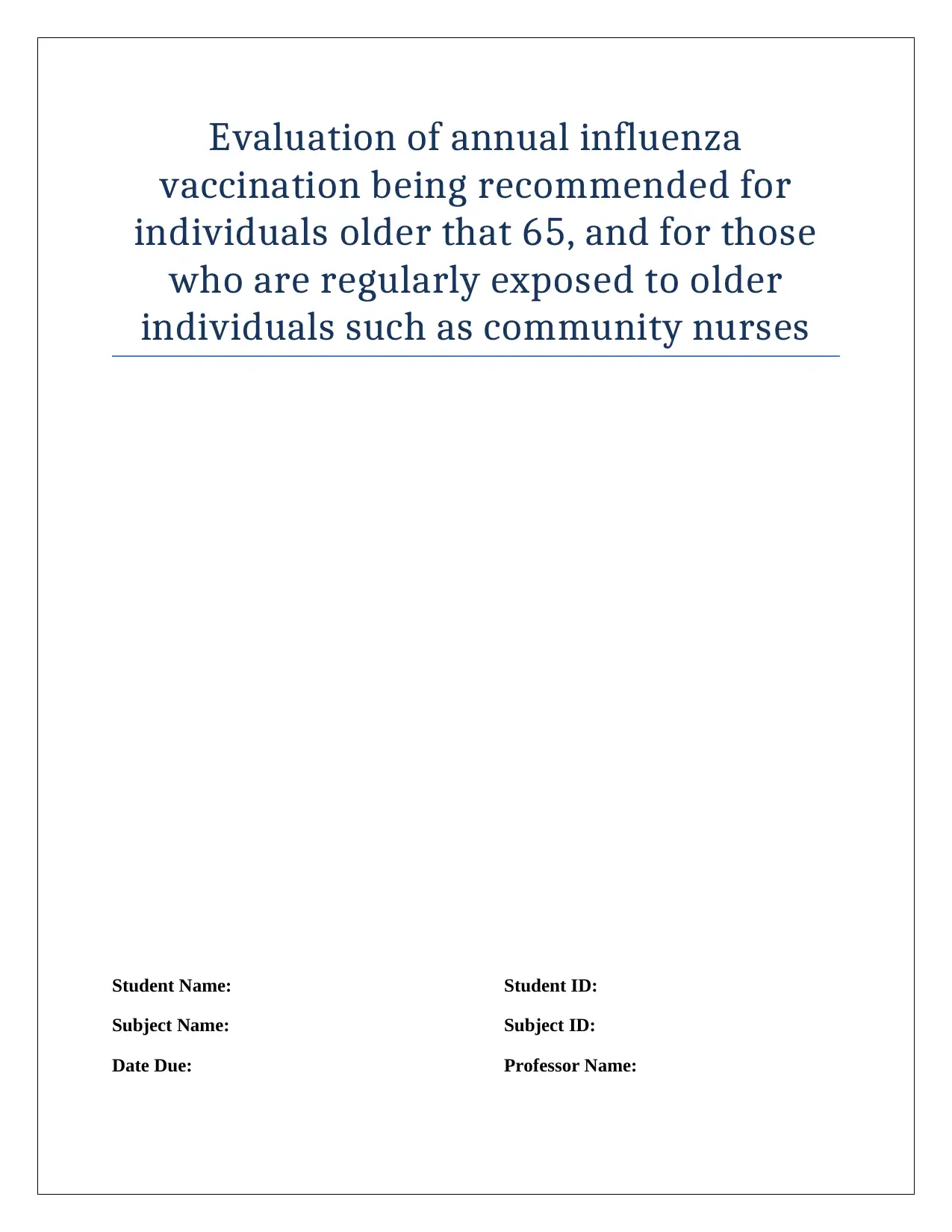
Evaluation of annual influenza
vaccination being recommended for
individuals older that 65, and for those
who are regularly exposed to older
individuals such as community nurses
Student Name: Student ID:
Subject Name: Subject ID:
Date Due: Professor Name:
vaccination being recommended for
individuals older that 65, and for those
who are regularly exposed to older
individuals such as community nurses
Student Name: Student ID:
Subject Name: Subject ID:
Date Due: Professor Name:
Secure Best Marks with AI Grader
Need help grading? Try our AI Grader for instant feedback on your assignments.
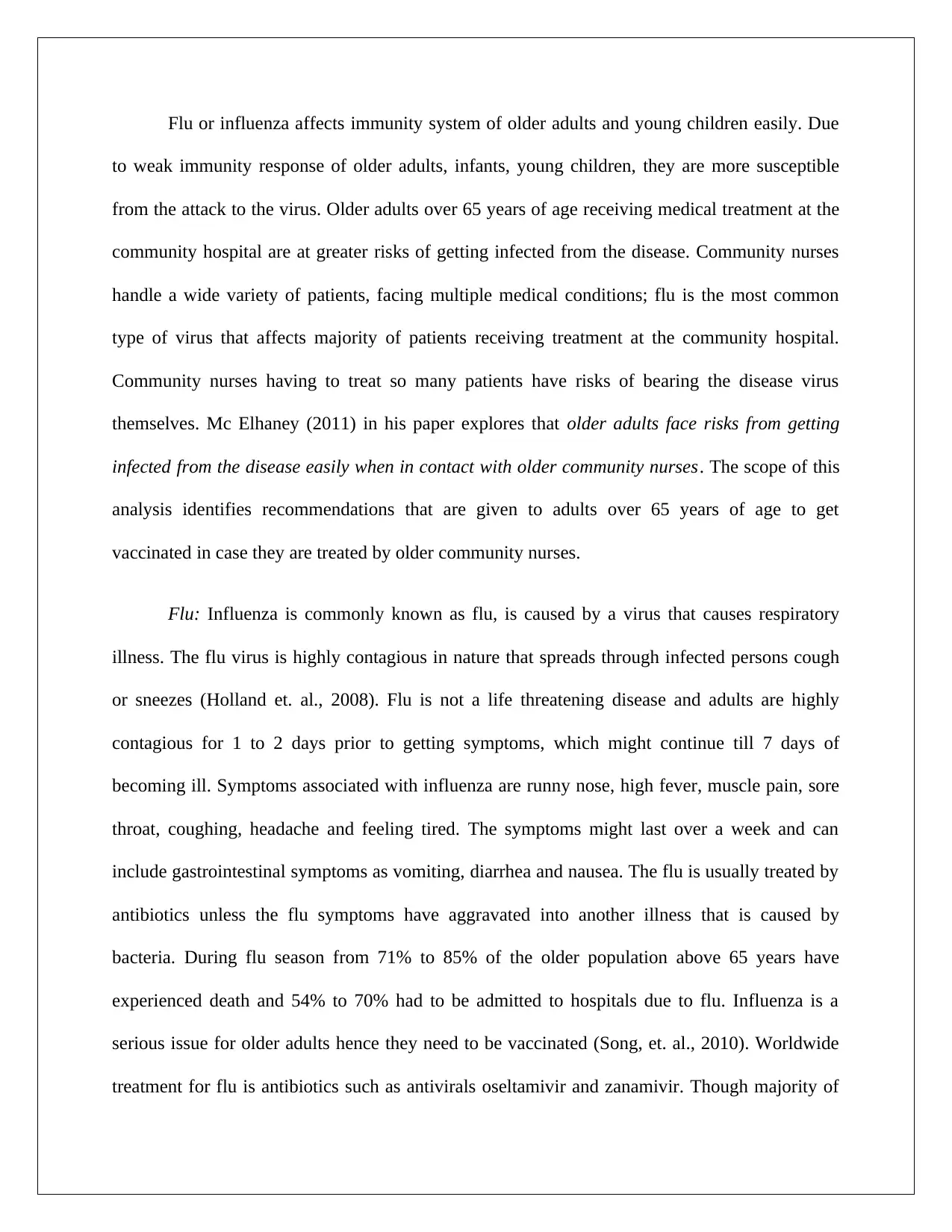
Flu or influenza affects immunity system of older adults and young children easily. Due
to weak immunity response of older adults, infants, young children, they are more susceptible
from the attack to the virus. Older adults over 65 years of age receiving medical treatment at the
community hospital are at greater risks of getting infected from the disease. Community nurses
handle a wide variety of patients, facing multiple medical conditions; flu is the most common
type of virus that affects majority of patients receiving treatment at the community hospital.
Community nurses having to treat so many patients have risks of bearing the disease virus
themselves. Mc Elhaney (2011) in his paper explores that older adults face risks from getting
infected from the disease easily when in contact with older community nurses. The scope of this
analysis identifies recommendations that are given to adults over 65 years of age to get
vaccinated in case they are treated by older community nurses.
Flu: Influenza is commonly known as flu, is caused by a virus that causes respiratory
illness. The flu virus is highly contagious in nature that spreads through infected persons cough
or sneezes (Holland et. al., 2008). Flu is not a life threatening disease and adults are highly
contagious for 1 to 2 days prior to getting symptoms, which might continue till 7 days of
becoming ill. Symptoms associated with influenza are runny nose, high fever, muscle pain, sore
throat, coughing, headache and feeling tired. The symptoms might last over a week and can
include gastrointestinal symptoms as vomiting, diarrhea and nausea. The flu is usually treated by
antibiotics unless the flu symptoms have aggravated into another illness that is caused by
bacteria. During flu season from 71% to 85% of the older population above 65 years have
experienced death and 54% to 70% had to be admitted to hospitals due to flu. Influenza is a
serious issue for older adults hence they need to be vaccinated (Song, et. al., 2010). Worldwide
treatment for flu is antibiotics such as antivirals oseltamivir and zanamivir. Though majority of
to weak immunity response of older adults, infants, young children, they are more susceptible
from the attack to the virus. Older adults over 65 years of age receiving medical treatment at the
community hospital are at greater risks of getting infected from the disease. Community nurses
handle a wide variety of patients, facing multiple medical conditions; flu is the most common
type of virus that affects majority of patients receiving treatment at the community hospital.
Community nurses having to treat so many patients have risks of bearing the disease virus
themselves. Mc Elhaney (2011) in his paper explores that older adults face risks from getting
infected from the disease easily when in contact with older community nurses. The scope of this
analysis identifies recommendations that are given to adults over 65 years of age to get
vaccinated in case they are treated by older community nurses.
Flu: Influenza is commonly known as flu, is caused by a virus that causes respiratory
illness. The flu virus is highly contagious in nature that spreads through infected persons cough
or sneezes (Holland et. al., 2008). Flu is not a life threatening disease and adults are highly
contagious for 1 to 2 days prior to getting symptoms, which might continue till 7 days of
becoming ill. Symptoms associated with influenza are runny nose, high fever, muscle pain, sore
throat, coughing, headache and feeling tired. The symptoms might last over a week and can
include gastrointestinal symptoms as vomiting, diarrhea and nausea. The flu is usually treated by
antibiotics unless the flu symptoms have aggravated into another illness that is caused by
bacteria. During flu season from 71% to 85% of the older population above 65 years have
experienced death and 54% to 70% had to be admitted to hospitals due to flu. Influenza is a
serious issue for older adults hence they need to be vaccinated (Song, et. al., 2010). Worldwide
treatment for flu is antibiotics such as antivirals oseltamivir and zanamivir. Though majority of
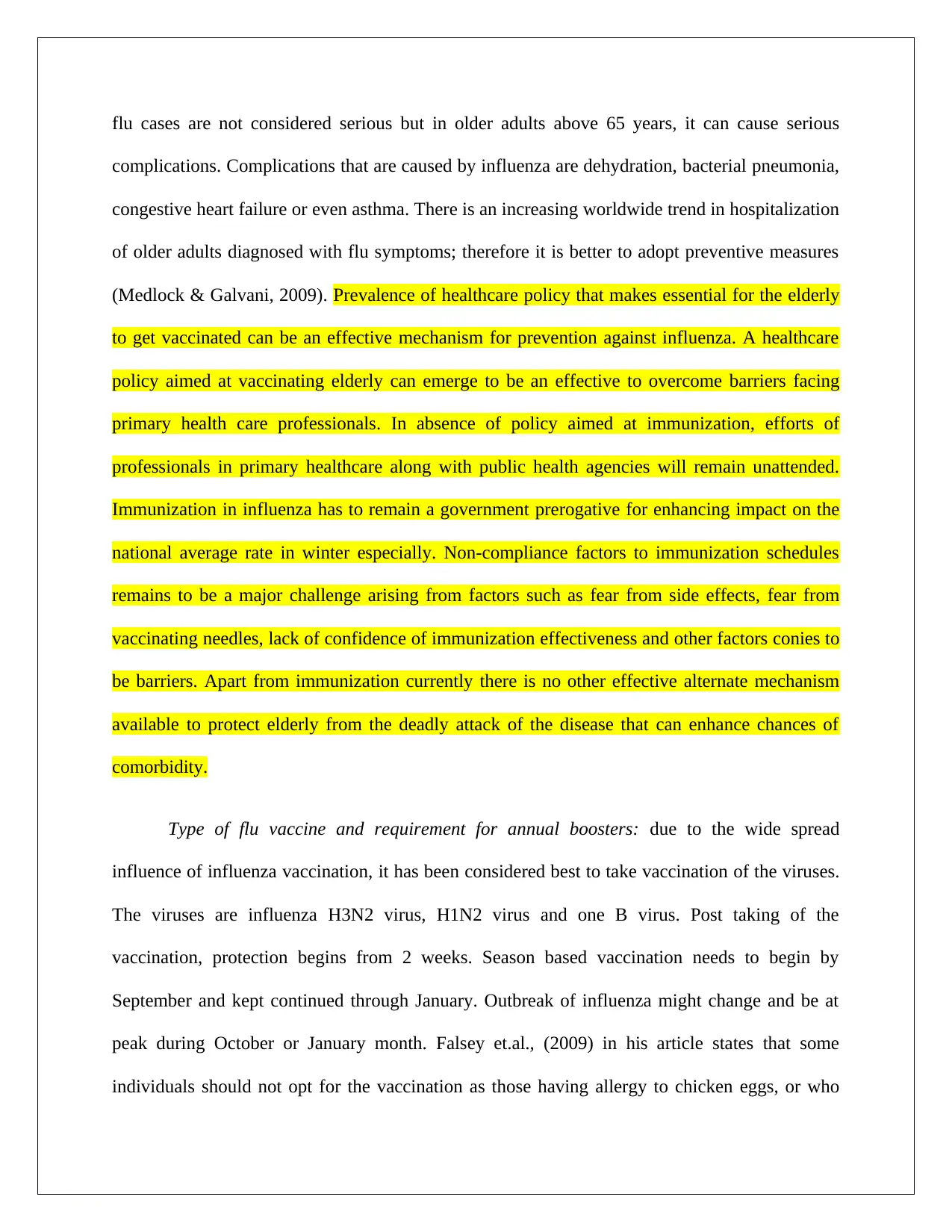
flu cases are not considered serious but in older adults above 65 years, it can cause serious
complications. Complications that are caused by influenza are dehydration, bacterial pneumonia,
congestive heart failure or even asthma. There is an increasing worldwide trend in hospitalization
of older adults diagnosed with flu symptoms; therefore it is better to adopt preventive measures
(Medlock & Galvani, 2009). Prevalence of healthcare policy that makes essential for the elderly
to get vaccinated can be an effective mechanism for prevention against influenza. A healthcare
policy aimed at vaccinating elderly can emerge to be an effective to overcome barriers facing
primary health care professionals. In absence of policy aimed at immunization, efforts of
professionals in primary healthcare along with public health agencies will remain unattended.
Immunization in influenza has to remain a government prerogative for enhancing impact on the
national average rate in winter especially. Non-compliance factors to immunization schedules
remains to be a major challenge arising from factors such as fear from side effects, fear from
vaccinating needles, lack of confidence of immunization effectiveness and other factors conies to
be barriers. Apart from immunization currently there is no other effective alternate mechanism
available to protect elderly from the deadly attack of the disease that can enhance chances of
comorbidity.
Type of flu vaccine and requirement for annual boosters: due to the wide spread
influence of influenza vaccination, it has been considered best to take vaccination of the viruses.
The viruses are influenza H3N2 virus, H1N2 virus and one B virus. Post taking of the
vaccination, protection begins from 2 weeks. Season based vaccination needs to begin by
September and kept continued through January. Outbreak of influenza might change and be at
peak during October or January month. Falsey et.al., (2009) in his article states that some
individuals should not opt for the vaccination as those having allergy to chicken eggs, or who
complications. Complications that are caused by influenza are dehydration, bacterial pneumonia,
congestive heart failure or even asthma. There is an increasing worldwide trend in hospitalization
of older adults diagnosed with flu symptoms; therefore it is better to adopt preventive measures
(Medlock & Galvani, 2009). Prevalence of healthcare policy that makes essential for the elderly
to get vaccinated can be an effective mechanism for prevention against influenza. A healthcare
policy aimed at vaccinating elderly can emerge to be an effective to overcome barriers facing
primary health care professionals. In absence of policy aimed at immunization, efforts of
professionals in primary healthcare along with public health agencies will remain unattended.
Immunization in influenza has to remain a government prerogative for enhancing impact on the
national average rate in winter especially. Non-compliance factors to immunization schedules
remains to be a major challenge arising from factors such as fear from side effects, fear from
vaccinating needles, lack of confidence of immunization effectiveness and other factors conies to
be barriers. Apart from immunization currently there is no other effective alternate mechanism
available to protect elderly from the deadly attack of the disease that can enhance chances of
comorbidity.
Type of flu vaccine and requirement for annual boosters: due to the wide spread
influence of influenza vaccination, it has been considered best to take vaccination of the viruses.
The viruses are influenza H3N2 virus, H1N2 virus and one B virus. Post taking of the
vaccination, protection begins from 2 weeks. Season based vaccination needs to begin by
September and kept continued through January. Outbreak of influenza might change and be at
peak during October or January month. Falsey et.al., (2009) in his article states that some
individuals should not opt for the vaccination as those having allergy to chicken eggs, or who
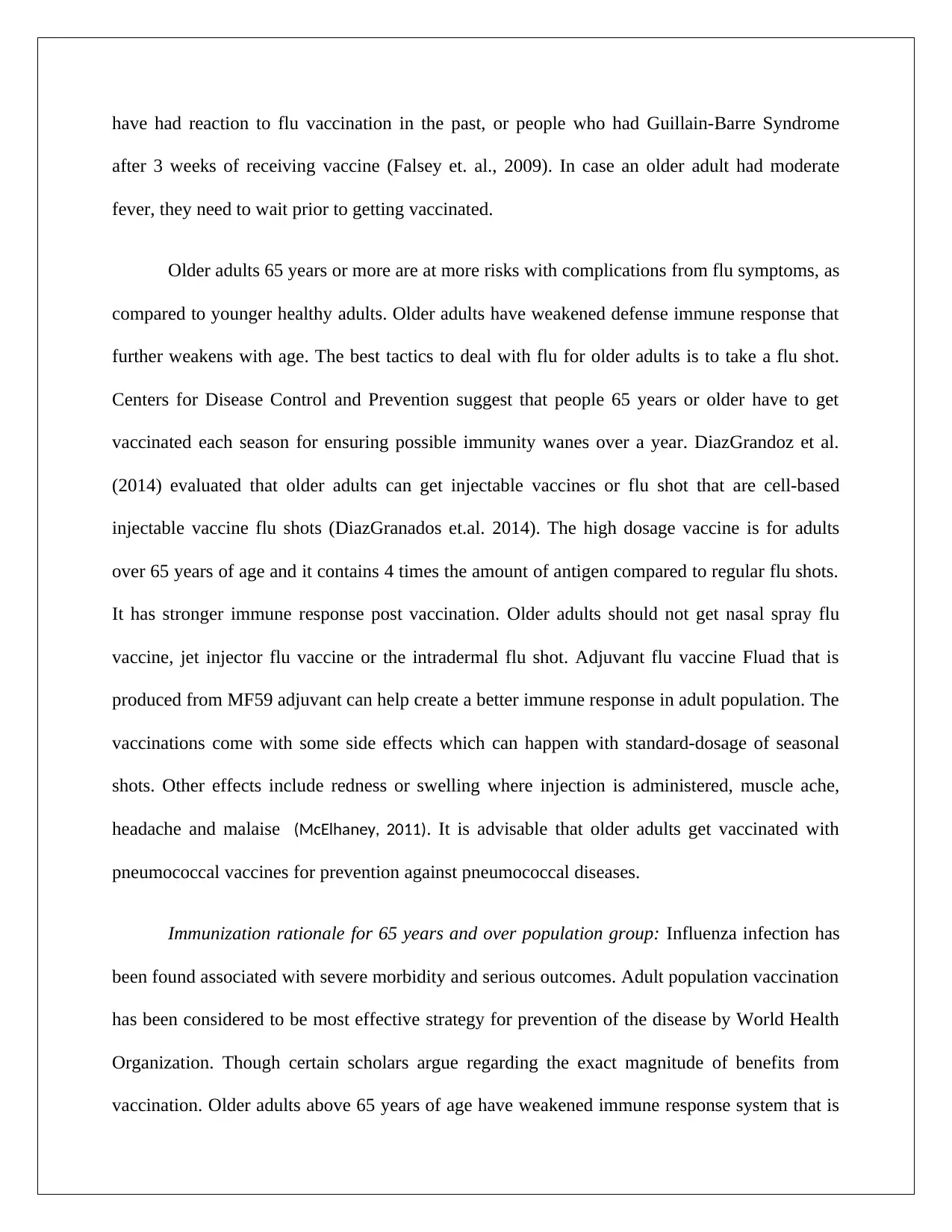
have had reaction to flu vaccination in the past, or people who had Guillain-Barre Syndrome
after 3 weeks of receiving vaccine (Falsey et. al., 2009). In case an older adult had moderate
fever, they need to wait prior to getting vaccinated.
Older adults 65 years or more are at more risks with complications from flu symptoms, as
compared to younger healthy adults. Older adults have weakened defense immune response that
further weakens with age. The best tactics to deal with flu for older adults is to take a flu shot.
Centers for Disease Control and Prevention suggest that people 65 years or older have to get
vaccinated each season for ensuring possible immunity wanes over a year. DiazGrandoz et al.
(2014) evaluated that older adults can get injectable vaccines or flu shot that are cell-based
injectable vaccine flu shots (DiazGranados et.al. 2014). The high dosage vaccine is for adults
over 65 years of age and it contains 4 times the amount of antigen compared to regular flu shots.
It has stronger immune response post vaccination. Older adults should not get nasal spray flu
vaccine, jet injector flu vaccine or the intradermal flu shot. Adjuvant flu vaccine Fluad that is
produced from MF59 adjuvant can help create a better immune response in adult population. The
vaccinations come with some side effects which can happen with standard-dosage of seasonal
shots. Other effects include redness or swelling where injection is administered, muscle ache,
headache and malaise (McElhaney, 2011). It is advisable that older adults get vaccinated with
pneumococcal vaccines for prevention against pneumococcal diseases.
Immunization rationale for 65 years and over population group: Influenza infection has
been found associated with severe morbidity and serious outcomes. Adult population vaccination
has been considered to be most effective strategy for prevention of the disease by World Health
Organization. Though certain scholars argue regarding the exact magnitude of benefits from
vaccination. Older adults above 65 years of age have weakened immune response system that is
after 3 weeks of receiving vaccine (Falsey et. al., 2009). In case an older adult had moderate
fever, they need to wait prior to getting vaccinated.
Older adults 65 years or more are at more risks with complications from flu symptoms, as
compared to younger healthy adults. Older adults have weakened defense immune response that
further weakens with age. The best tactics to deal with flu for older adults is to take a flu shot.
Centers for Disease Control and Prevention suggest that people 65 years or older have to get
vaccinated each season for ensuring possible immunity wanes over a year. DiazGrandoz et al.
(2014) evaluated that older adults can get injectable vaccines or flu shot that are cell-based
injectable vaccine flu shots (DiazGranados et.al. 2014). The high dosage vaccine is for adults
over 65 years of age and it contains 4 times the amount of antigen compared to regular flu shots.
It has stronger immune response post vaccination. Older adults should not get nasal spray flu
vaccine, jet injector flu vaccine or the intradermal flu shot. Adjuvant flu vaccine Fluad that is
produced from MF59 adjuvant can help create a better immune response in adult population. The
vaccinations come with some side effects which can happen with standard-dosage of seasonal
shots. Other effects include redness or swelling where injection is administered, muscle ache,
headache and malaise (McElhaney, 2011). It is advisable that older adults get vaccinated with
pneumococcal vaccines for prevention against pneumococcal diseases.
Immunization rationale for 65 years and over population group: Influenza infection has
been found associated with severe morbidity and serious outcomes. Adult population vaccination
has been considered to be most effective strategy for prevention of the disease by World Health
Organization. Though certain scholars argue regarding the exact magnitude of benefits from
vaccination. Older adults above 65 years of age have weakened immune response system that is
Secure Best Marks with AI Grader
Need help grading? Try our AI Grader for instant feedback on your assignments.
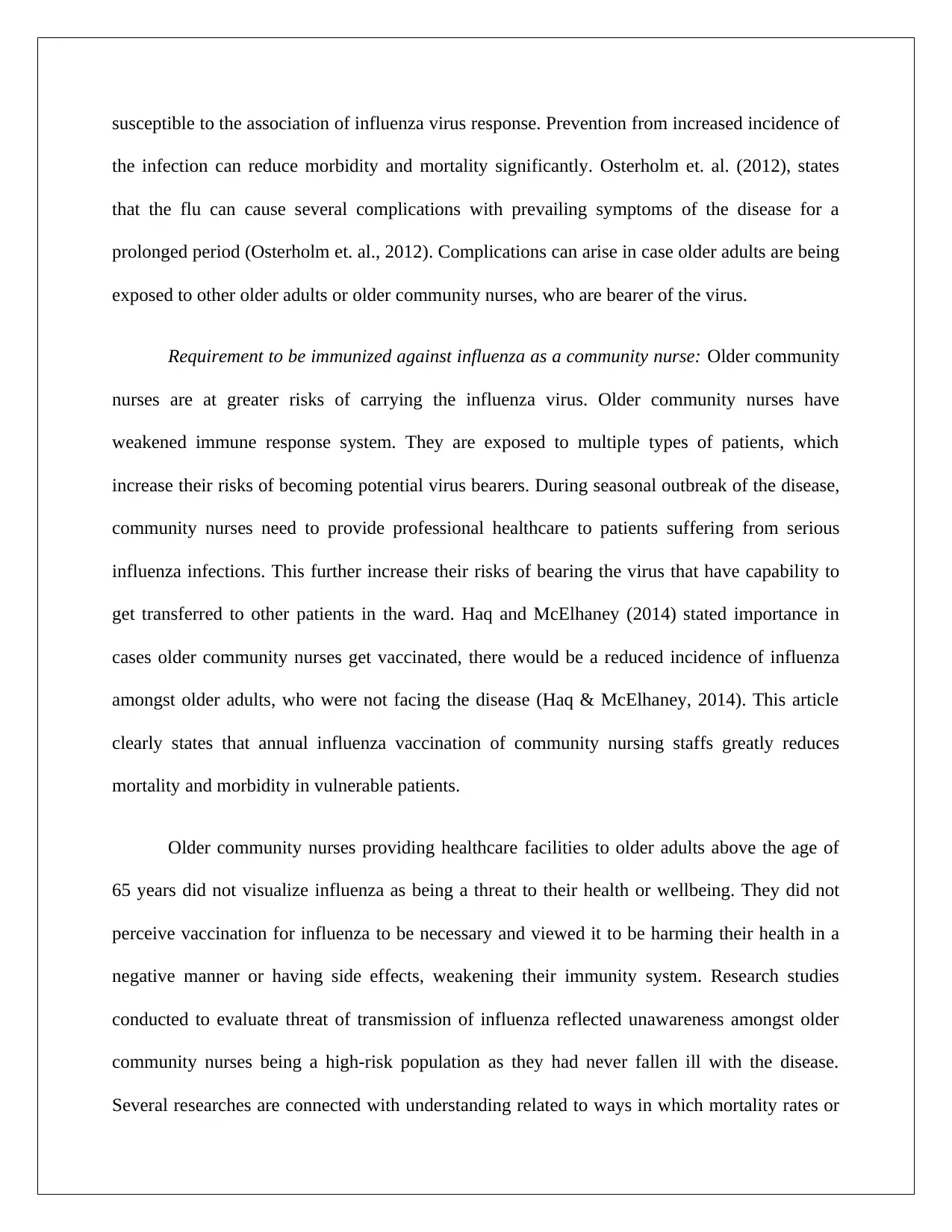
susceptible to the association of influenza virus response. Prevention from increased incidence of
the infection can reduce morbidity and mortality significantly. Osterholm et. al. (2012), states
that the flu can cause several complications with prevailing symptoms of the disease for a
prolonged period (Osterholm et. al., 2012). Complications can arise in case older adults are being
exposed to other older adults or older community nurses, who are bearer of the virus.
Requirement to be immunized against influenza as a community nurse: Older community
nurses are at greater risks of carrying the influenza virus. Older community nurses have
weakened immune response system. They are exposed to multiple types of patients, which
increase their risks of becoming potential virus bearers. During seasonal outbreak of the disease,
community nurses need to provide professional healthcare to patients suffering from serious
influenza infections. This further increase their risks of bearing the virus that have capability to
get transferred to other patients in the ward. Haq and McElhaney (2014) stated importance in
cases older community nurses get vaccinated, there would be a reduced incidence of influenza
amongst older adults, who were not facing the disease (Haq & McElhaney, 2014). This article
clearly states that annual influenza vaccination of community nursing staffs greatly reduces
mortality and morbidity in vulnerable patients.
Older community nurses providing healthcare facilities to older adults above the age of
65 years did not visualize influenza as being a threat to their health or wellbeing. They did not
perceive vaccination for influenza to be necessary and viewed it to be harming their health in a
negative manner or having side effects, weakening their immunity system. Research studies
conducted to evaluate threat of transmission of influenza reflected unawareness amongst older
community nurses being a high-risk population as they had never fallen ill with the disease.
Several researches are connected with understanding related to ways in which mortality rates or
the infection can reduce morbidity and mortality significantly. Osterholm et. al. (2012), states
that the flu can cause several complications with prevailing symptoms of the disease for a
prolonged period (Osterholm et. al., 2012). Complications can arise in case older adults are being
exposed to other older adults or older community nurses, who are bearer of the virus.
Requirement to be immunized against influenza as a community nurse: Older community
nurses are at greater risks of carrying the influenza virus. Older community nurses have
weakened immune response system. They are exposed to multiple types of patients, which
increase their risks of becoming potential virus bearers. During seasonal outbreak of the disease,
community nurses need to provide professional healthcare to patients suffering from serious
influenza infections. This further increase their risks of bearing the virus that have capability to
get transferred to other patients in the ward. Haq and McElhaney (2014) stated importance in
cases older community nurses get vaccinated, there would be a reduced incidence of influenza
amongst older adults, who were not facing the disease (Haq & McElhaney, 2014). This article
clearly states that annual influenza vaccination of community nursing staffs greatly reduces
mortality and morbidity in vulnerable patients.
Older community nurses providing healthcare facilities to older adults above the age of
65 years did not visualize influenza as being a threat to their health or wellbeing. They did not
perceive vaccination for influenza to be necessary and viewed it to be harming their health in a
negative manner or having side effects, weakening their immunity system. Research studies
conducted to evaluate threat of transmission of influenza reflected unawareness amongst older
community nurses being a high-risk population as they had never fallen ill with the disease.
Several researches are connected with understanding related to ways in which mortality rates or
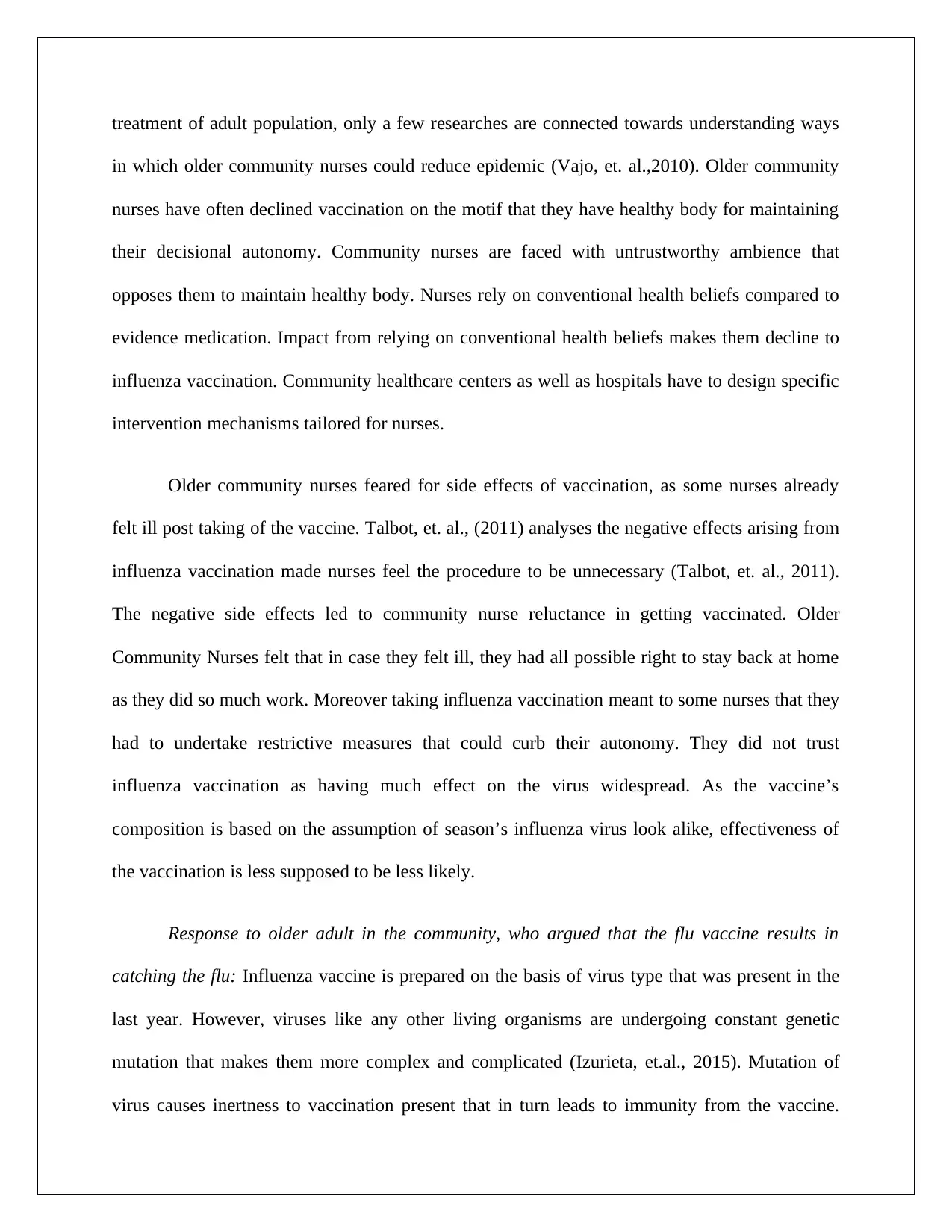
treatment of adult population, only a few researches are connected towards understanding ways
in which older community nurses could reduce epidemic (Vajo, et. al.,2010). Older community
nurses have often declined vaccination on the motif that they have healthy body for maintaining
their decisional autonomy. Community nurses are faced with untrustworthy ambience that
opposes them to maintain healthy body. Nurses rely on conventional health beliefs compared to
evidence medication. Impact from relying on conventional health beliefs makes them decline to
influenza vaccination. Community healthcare centers as well as hospitals have to design specific
intervention mechanisms tailored for nurses.
Older community nurses feared for side effects of vaccination, as some nurses already
felt ill post taking of the vaccine. Talbot, et. al., (2011) analyses the negative effects arising from
influenza vaccination made nurses feel the procedure to be unnecessary (Talbot, et. al., 2011).
The negative side effects led to community nurse reluctance in getting vaccinated. Older
Community Nurses felt that in case they felt ill, they had all possible right to stay back at home
as they did so much work. Moreover taking influenza vaccination meant to some nurses that they
had to undertake restrictive measures that could curb their autonomy. They did not trust
influenza vaccination as having much effect on the virus widespread. As the vaccine’s
composition is based on the assumption of season’s influenza virus look alike, effectiveness of
the vaccination is less supposed to be less likely.
Response to older adult in the community, who argued that the flu vaccine results in
catching the flu: Influenza vaccine is prepared on the basis of virus type that was present in the
last year. However, viruses like any other living organisms are undergoing constant genetic
mutation that makes them more complex and complicated (Izurieta, et.al., 2015). Mutation of
virus causes inertness to vaccination present that in turn leads to immunity from the vaccine.
in which older community nurses could reduce epidemic (Vajo, et. al.,2010). Older community
nurses have often declined vaccination on the motif that they have healthy body for maintaining
their decisional autonomy. Community nurses are faced with untrustworthy ambience that
opposes them to maintain healthy body. Nurses rely on conventional health beliefs compared to
evidence medication. Impact from relying on conventional health beliefs makes them decline to
influenza vaccination. Community healthcare centers as well as hospitals have to design specific
intervention mechanisms tailored for nurses.
Older community nurses feared for side effects of vaccination, as some nurses already
felt ill post taking of the vaccine. Talbot, et. al., (2011) analyses the negative effects arising from
influenza vaccination made nurses feel the procedure to be unnecessary (Talbot, et. al., 2011).
The negative side effects led to community nurse reluctance in getting vaccinated. Older
Community Nurses felt that in case they felt ill, they had all possible right to stay back at home
as they did so much work. Moreover taking influenza vaccination meant to some nurses that they
had to undertake restrictive measures that could curb their autonomy. They did not trust
influenza vaccination as having much effect on the virus widespread. As the vaccine’s
composition is based on the assumption of season’s influenza virus look alike, effectiveness of
the vaccination is less supposed to be less likely.
Response to older adult in the community, who argued that the flu vaccine results in
catching the flu: Influenza vaccine is prepared on the basis of virus type that was present in the
last year. However, viruses like any other living organisms are undergoing constant genetic
mutation that makes them more complex and complicated (Izurieta, et.al., 2015). Mutation of
virus causes inertness to vaccination present that in turn leads to immunity from the vaccine.
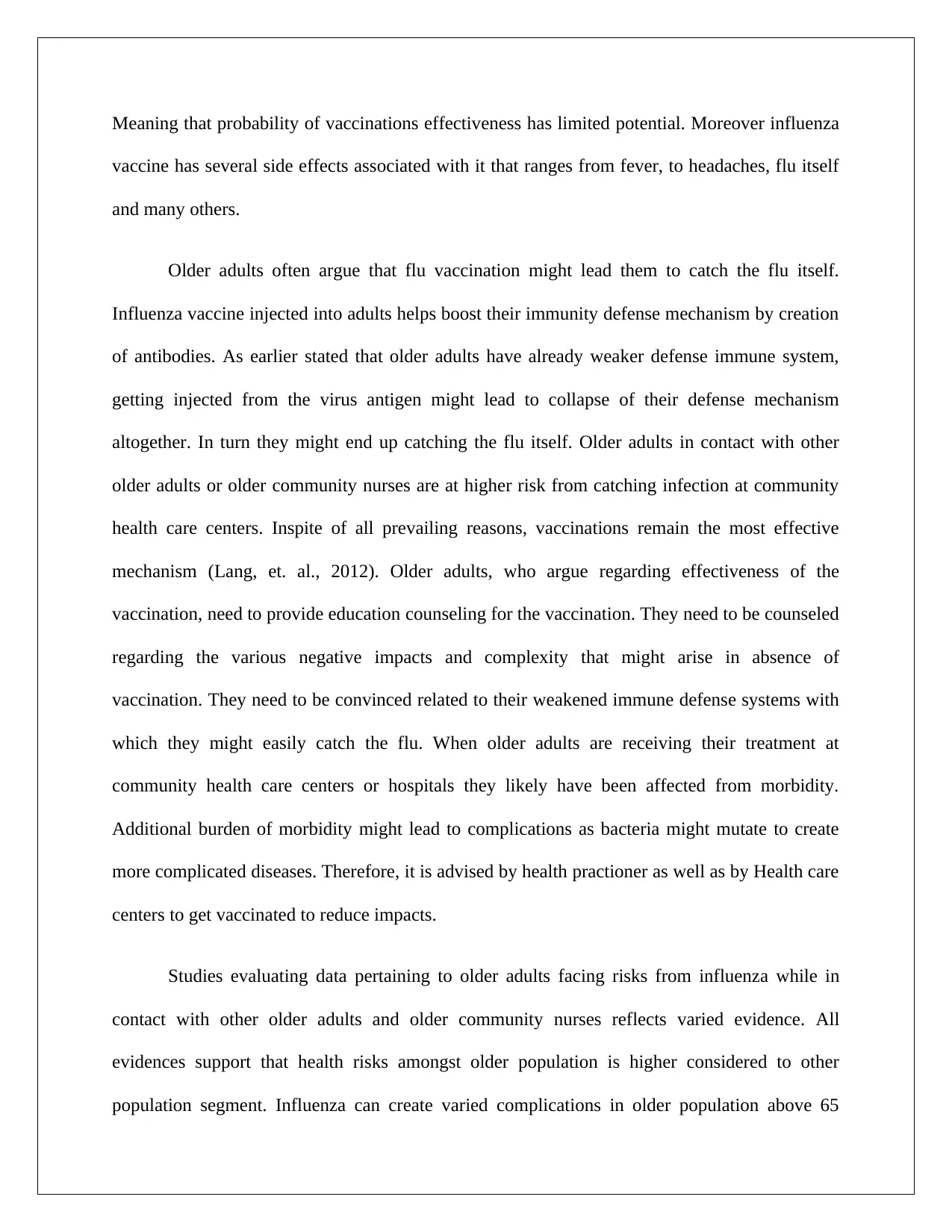
Meaning that probability of vaccinations effectiveness has limited potential. Moreover influenza
vaccine has several side effects associated with it that ranges from fever, to headaches, flu itself
and many others.
Older adults often argue that flu vaccination might lead them to catch the flu itself.
Influenza vaccine injected into adults helps boost their immunity defense mechanism by creation
of antibodies. As earlier stated that older adults have already weaker defense immune system,
getting injected from the virus antigen might lead to collapse of their defense mechanism
altogether. In turn they might end up catching the flu itself. Older adults in contact with other
older adults or older community nurses are at higher risk from catching infection at community
health care centers. Inspite of all prevailing reasons, vaccinations remain the most effective
mechanism (Lang, et. al., 2012). Older adults, who argue regarding effectiveness of the
vaccination, need to provide education counseling for the vaccination. They need to be counseled
regarding the various negative impacts and complexity that might arise in absence of
vaccination. They need to be convinced related to their weakened immune defense systems with
which they might easily catch the flu. When older adults are receiving their treatment at
community health care centers or hospitals they likely have been affected from morbidity.
Additional burden of morbidity might lead to complications as bacteria might mutate to create
more complicated diseases. Therefore, it is advised by health practioner as well as by Health care
centers to get vaccinated to reduce impacts.
Studies evaluating data pertaining to older adults facing risks from influenza while in
contact with other older adults and older community nurses reflects varied evidence. All
evidences support that health risks amongst older population is higher considered to other
population segment. Influenza can create varied complications in older population above 65
vaccine has several side effects associated with it that ranges from fever, to headaches, flu itself
and many others.
Older adults often argue that flu vaccination might lead them to catch the flu itself.
Influenza vaccine injected into adults helps boost their immunity defense mechanism by creation
of antibodies. As earlier stated that older adults have already weaker defense immune system,
getting injected from the virus antigen might lead to collapse of their defense mechanism
altogether. In turn they might end up catching the flu itself. Older adults in contact with other
older adults or older community nurses are at higher risk from catching infection at community
health care centers. Inspite of all prevailing reasons, vaccinations remain the most effective
mechanism (Lang, et. al., 2012). Older adults, who argue regarding effectiveness of the
vaccination, need to provide education counseling for the vaccination. They need to be counseled
regarding the various negative impacts and complexity that might arise in absence of
vaccination. They need to be convinced related to their weakened immune defense systems with
which they might easily catch the flu. When older adults are receiving their treatment at
community health care centers or hospitals they likely have been affected from morbidity.
Additional burden of morbidity might lead to complications as bacteria might mutate to create
more complicated diseases. Therefore, it is advised by health practioner as well as by Health care
centers to get vaccinated to reduce impacts.
Studies evaluating data pertaining to older adults facing risks from influenza while in
contact with other older adults and older community nurses reflects varied evidence. All
evidences support that health risks amongst older population is higher considered to other
population segment. Influenza can create varied complications in older population above 65
Paraphrase This Document
Need a fresh take? Get an instant paraphrase of this document with our AI Paraphraser
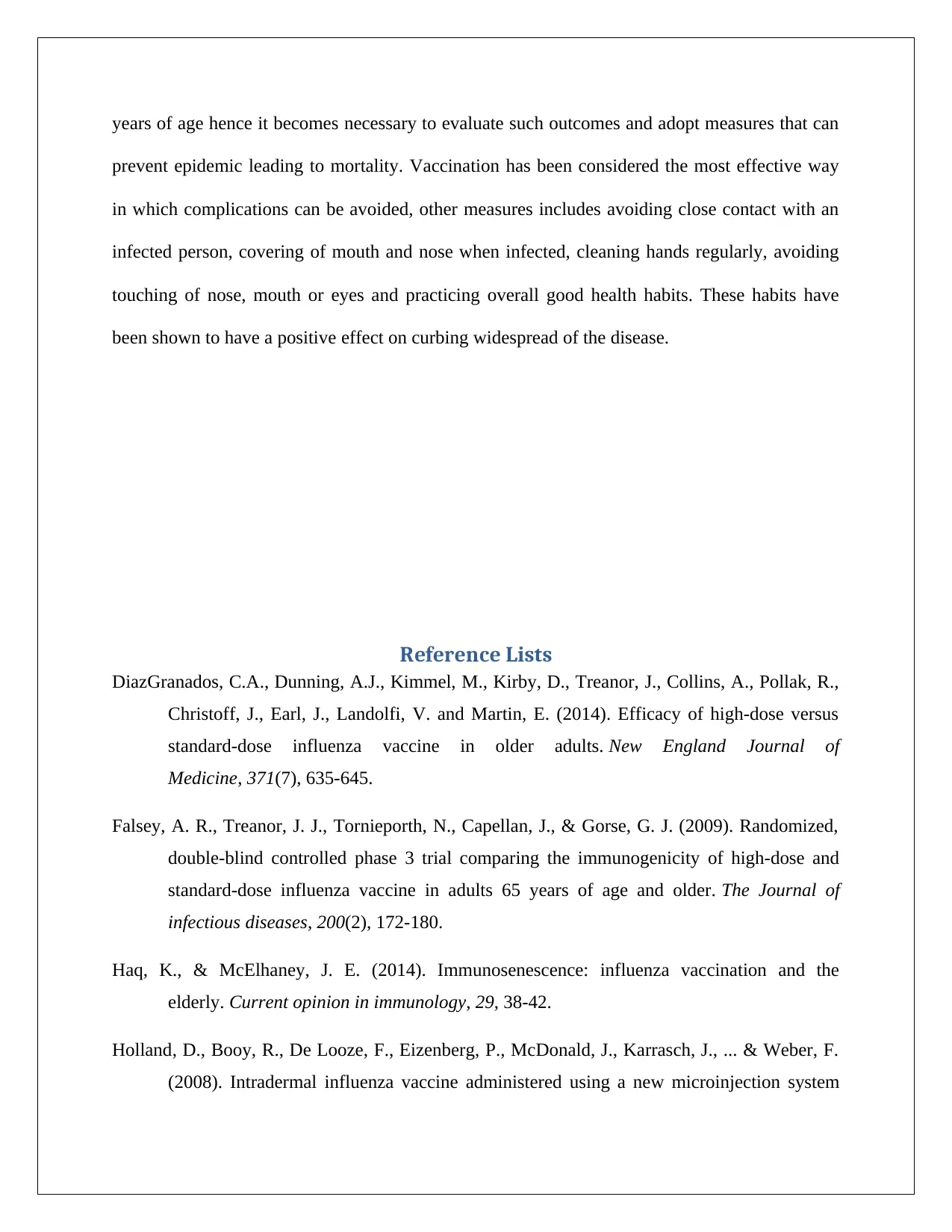
years of age hence it becomes necessary to evaluate such outcomes and adopt measures that can
prevent epidemic leading to mortality. Vaccination has been considered the most effective way
in which complications can be avoided, other measures includes avoiding close contact with an
infected person, covering of mouth and nose when infected, cleaning hands regularly, avoiding
touching of nose, mouth or eyes and practicing overall good health habits. These habits have
been shown to have a positive effect on curbing widespread of the disease.
Reference Lists
DiazGranados, C.A., Dunning, A.J., Kimmel, M., Kirby, D., Treanor, J., Collins, A., Pollak, R.,
Christoff, J., Earl, J., Landolfi, V. and Martin, E. (2014). Efficacy of high-dose versus
standard-dose influenza vaccine in older adults. New England Journal of
Medicine, 371(7), 635-645.
Falsey, A. R., Treanor, J. J., Tornieporth, N., Capellan, J., & Gorse, G. J. (2009). Randomized,
double-blind controlled phase 3 trial comparing the immunogenicity of high-dose and
standard-dose influenza vaccine in adults 65 years of age and older. The Journal of
infectious diseases, 200(2), 172-180.
Haq, K., & McElhaney, J. E. (2014). Immunosenescence: influenza vaccination and the
elderly. Current opinion in immunology, 29, 38-42.
Holland, D., Booy, R., De Looze, F., Eizenberg, P., McDonald, J., Karrasch, J., ... & Weber, F.
(2008). Intradermal influenza vaccine administered using a new microinjection system
prevent epidemic leading to mortality. Vaccination has been considered the most effective way
in which complications can be avoided, other measures includes avoiding close contact with an
infected person, covering of mouth and nose when infected, cleaning hands regularly, avoiding
touching of nose, mouth or eyes and practicing overall good health habits. These habits have
been shown to have a positive effect on curbing widespread of the disease.
Reference Lists
DiazGranados, C.A., Dunning, A.J., Kimmel, M., Kirby, D., Treanor, J., Collins, A., Pollak, R.,
Christoff, J., Earl, J., Landolfi, V. and Martin, E. (2014). Efficacy of high-dose versus
standard-dose influenza vaccine in older adults. New England Journal of
Medicine, 371(7), 635-645.
Falsey, A. R., Treanor, J. J., Tornieporth, N., Capellan, J., & Gorse, G. J. (2009). Randomized,
double-blind controlled phase 3 trial comparing the immunogenicity of high-dose and
standard-dose influenza vaccine in adults 65 years of age and older. The Journal of
infectious diseases, 200(2), 172-180.
Haq, K., & McElhaney, J. E. (2014). Immunosenescence: influenza vaccination and the
elderly. Current opinion in immunology, 29, 38-42.
Holland, D., Booy, R., De Looze, F., Eizenberg, P., McDonald, J., Karrasch, J., ... & Weber, F.
(2008). Intradermal influenza vaccine administered using a new microinjection system
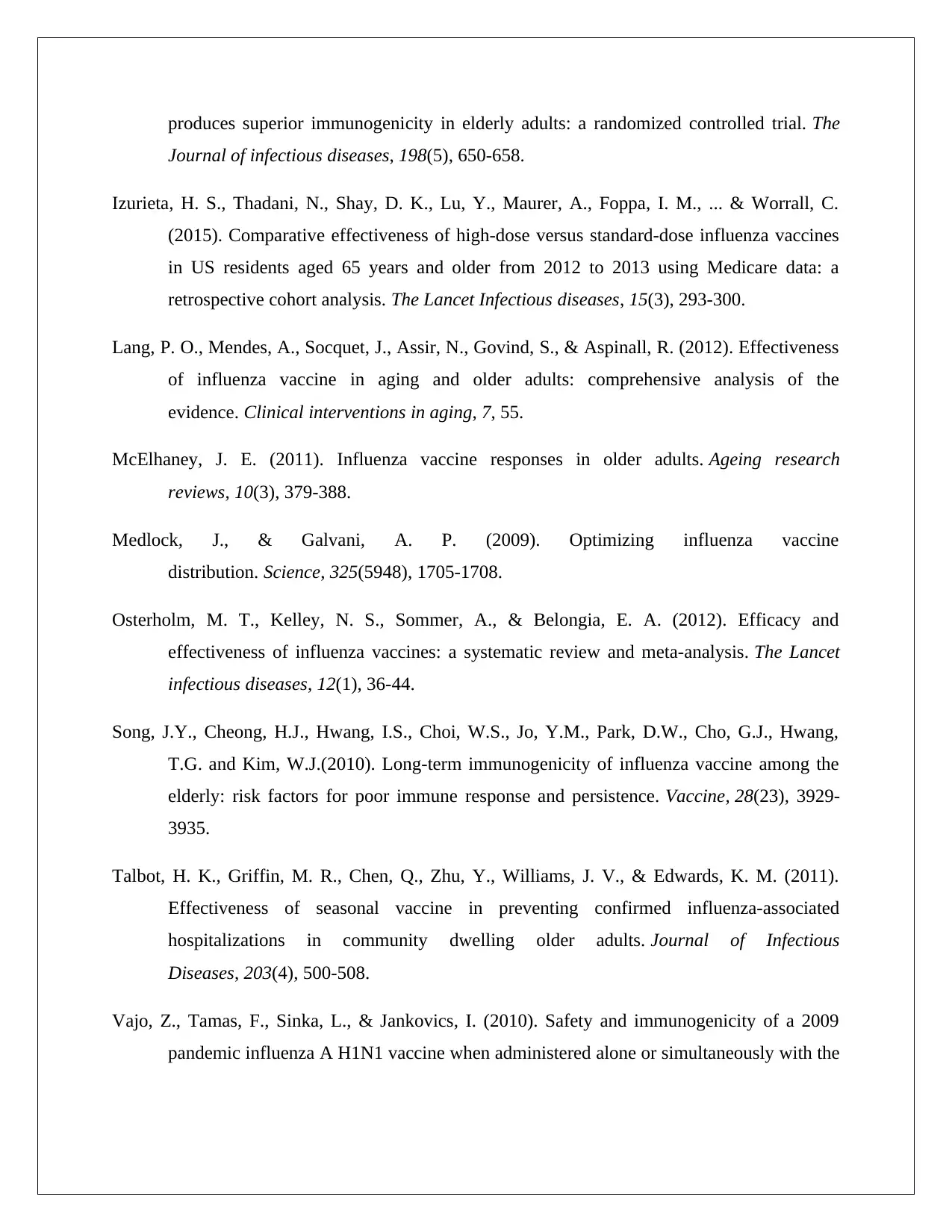
produces superior immunogenicity in elderly adults: a randomized controlled trial. The
Journal of infectious diseases, 198(5), 650-658.
Izurieta, H. S., Thadani, N., Shay, D. K., Lu, Y., Maurer, A., Foppa, I. M., ... & Worrall, C.
(2015). Comparative effectiveness of high-dose versus standard-dose influenza vaccines
in US residents aged 65 years and older from 2012 to 2013 using Medicare data: a
retrospective cohort analysis. The Lancet Infectious diseases, 15(3), 293-300.
Lang, P. O., Mendes, A., Socquet, J., Assir, N., Govind, S., & Aspinall, R. (2012). Effectiveness
of influenza vaccine in aging and older adults: comprehensive analysis of the
evidence. Clinical interventions in aging, 7, 55.
McElhaney, J. E. (2011). Influenza vaccine responses in older adults. Ageing research
reviews, 10(3), 379-388.
Medlock, J., & Galvani, A. P. (2009). Optimizing influenza vaccine
distribution. Science, 325(5948), 1705-1708.
Osterholm, M. T., Kelley, N. S., Sommer, A., & Belongia, E. A. (2012). Efficacy and
effectiveness of influenza vaccines: a systematic review and meta-analysis. The Lancet
infectious diseases, 12(1), 36-44.
Song, J.Y., Cheong, H.J., Hwang, I.S., Choi, W.S., Jo, Y.M., Park, D.W., Cho, G.J., Hwang,
T.G. and Kim, W.J.(2010). Long-term immunogenicity of influenza vaccine among the
elderly: risk factors for poor immune response and persistence. Vaccine, 28(23), 3929-
3935.
Talbot, H. K., Griffin, M. R., Chen, Q., Zhu, Y., Williams, J. V., & Edwards, K. M. (2011).
Effectiveness of seasonal vaccine in preventing confirmed influenza-associated
hospitalizations in community dwelling older adults. Journal of Infectious
Diseases, 203(4), 500-508.
Vajo, Z., Tamas, F., Sinka, L., & Jankovics, I. (2010). Safety and immunogenicity of a 2009
pandemic influenza A H1N1 vaccine when administered alone or simultaneously with the
Journal of infectious diseases, 198(5), 650-658.
Izurieta, H. S., Thadani, N., Shay, D. K., Lu, Y., Maurer, A., Foppa, I. M., ... & Worrall, C.
(2015). Comparative effectiveness of high-dose versus standard-dose influenza vaccines
in US residents aged 65 years and older from 2012 to 2013 using Medicare data: a
retrospective cohort analysis. The Lancet Infectious diseases, 15(3), 293-300.
Lang, P. O., Mendes, A., Socquet, J., Assir, N., Govind, S., & Aspinall, R. (2012). Effectiveness
of influenza vaccine in aging and older adults: comprehensive analysis of the
evidence. Clinical interventions in aging, 7, 55.
McElhaney, J. E. (2011). Influenza vaccine responses in older adults. Ageing research
reviews, 10(3), 379-388.
Medlock, J., & Galvani, A. P. (2009). Optimizing influenza vaccine
distribution. Science, 325(5948), 1705-1708.
Osterholm, M. T., Kelley, N. S., Sommer, A., & Belongia, E. A. (2012). Efficacy and
effectiveness of influenza vaccines: a systematic review and meta-analysis. The Lancet
infectious diseases, 12(1), 36-44.
Song, J.Y., Cheong, H.J., Hwang, I.S., Choi, W.S., Jo, Y.M., Park, D.W., Cho, G.J., Hwang,
T.G. and Kim, W.J.(2010). Long-term immunogenicity of influenza vaccine among the
elderly: risk factors for poor immune response and persistence. Vaccine, 28(23), 3929-
3935.
Talbot, H. K., Griffin, M. R., Chen, Q., Zhu, Y., Williams, J. V., & Edwards, K. M. (2011).
Effectiveness of seasonal vaccine in preventing confirmed influenza-associated
hospitalizations in community dwelling older adults. Journal of Infectious
Diseases, 203(4), 500-508.
Vajo, Z., Tamas, F., Sinka, L., & Jankovics, I. (2010). Safety and immunogenicity of a 2009
pandemic influenza A H1N1 vaccine when administered alone or simultaneously with the
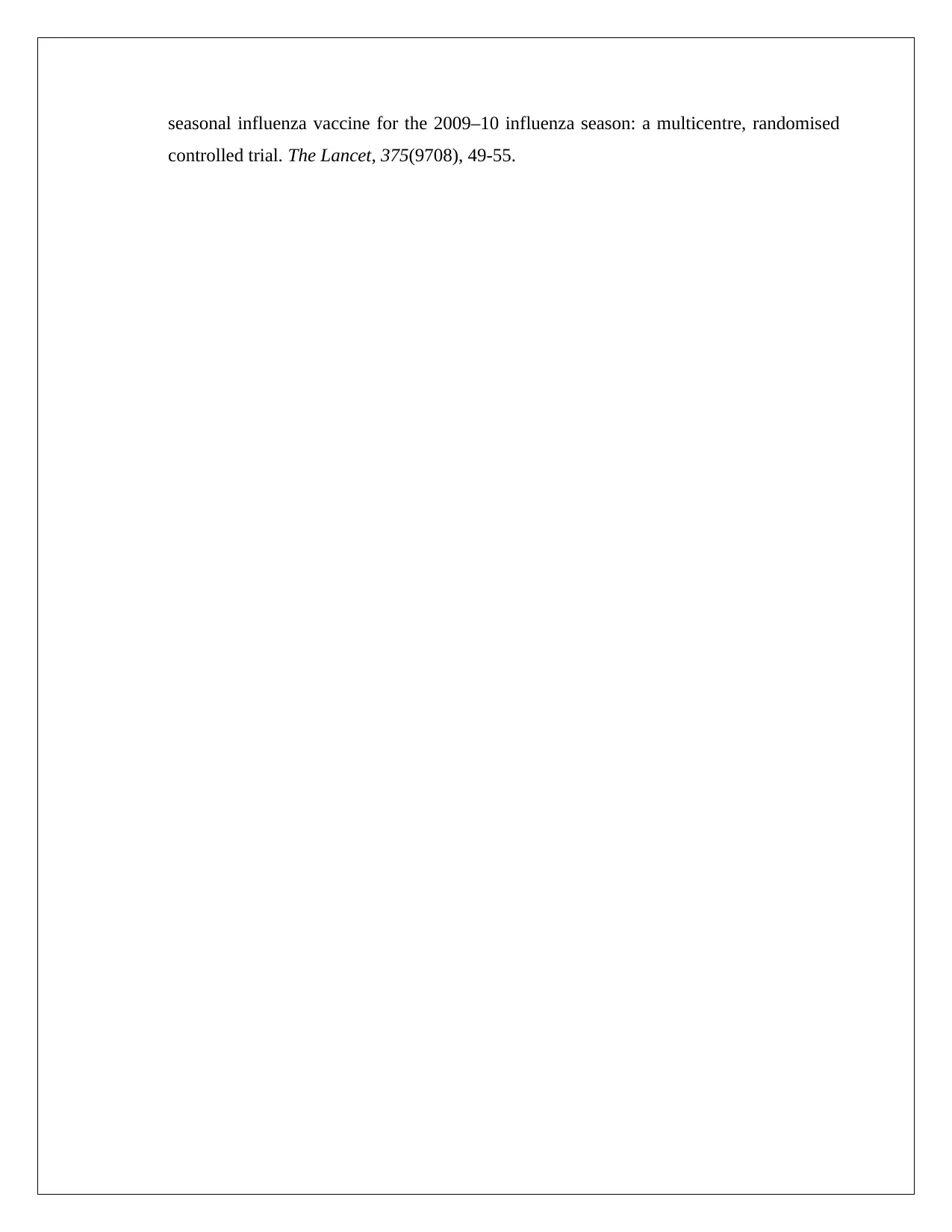
seasonal influenza vaccine for the 2009–10 influenza season: a multicentre, randomised
controlled trial. The Lancet, 375(9708), 49-55.
controlled trial. The Lancet, 375(9708), 49-55.
1 out of 10
Related Documents
Your All-in-One AI-Powered Toolkit for Academic Success.
+13062052269
info@desklib.com
Available 24*7 on WhatsApp / Email
![[object Object]](/_next/static/media/star-bottom.7253800d.svg)
Unlock your academic potential
© 2024 | Zucol Services PVT LTD | All rights reserved.





